#two-spirit
Text
Their name was Nex Benedict.
Nex Benedict, not whatever name the news keeps saying.
Nex used He/Him pronouns according to friends, not whatever the news keeps saying.
Nex was the victim of a hate crime. Nex's death was because of a hate crime. Nex's death was not an accident, it was a hate crime.
#nex benedict#nex#justice for nex benedict#nonbinary#lgbtqia2s+#lgbtqia+#lgbtqi+#lgbtq+#lgbt+#nonbinary rights are human rights#protect nonbinary kids#justice for nonbinary kids#2 spirit#two spirit#2-spirit#two-spirit
5K notes
·
View notes
Text
I also want white people to realize that it is incredibly common for two-spirit people to use a different label and pronouns when in predominantly white queer spaces because of how two spirits are treated. You can also be trans and nonbinary and also two-spirit separately.
When Nex’s community say they claim them as two-spirit, I believe them. Nex was one of our relations and the whole two-spirit community is grieving them. Please understand this is even more personal for Natives because this is yet another MMIP case that officials are attempting to swipe under the rug.
#two spirit#two-spirit#2 spirit#nex benedict#child death#murder#transphobia#anti indigenous violence#racism#hate crime
328 notes
·
View notes
Photo
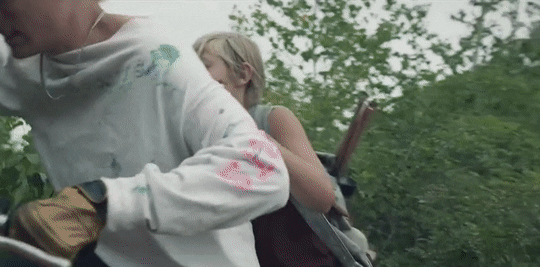

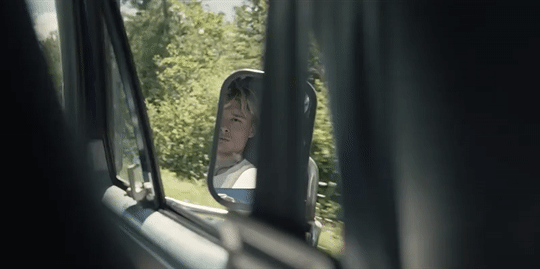

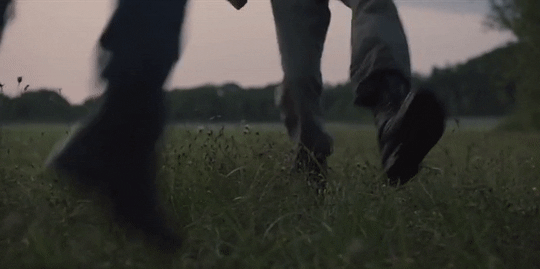
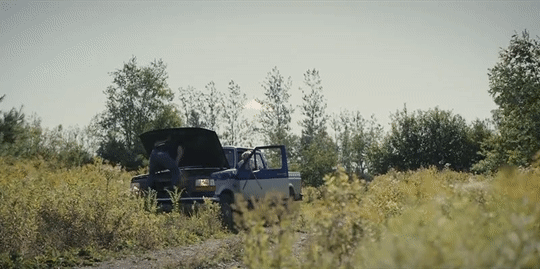
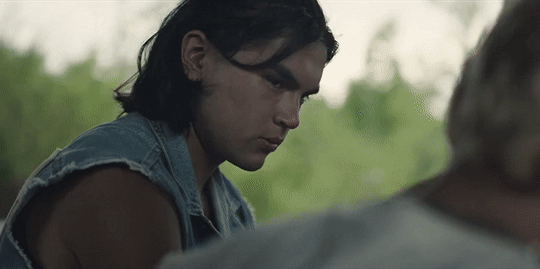
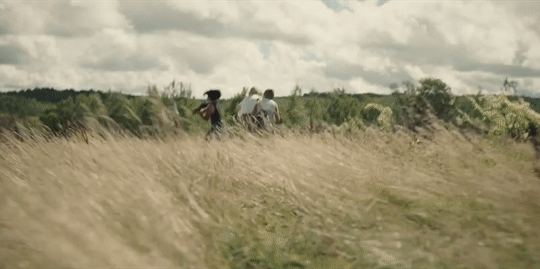
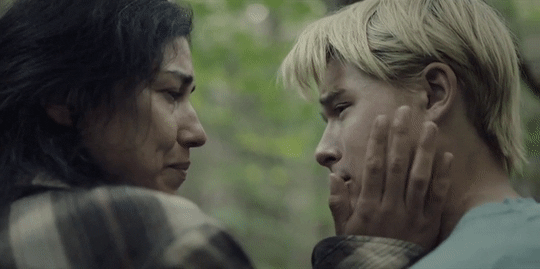
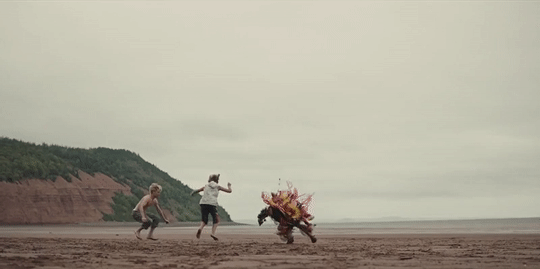
WILDHOOD (2021)
dir. Bretten Hannam
In a rural East Coast trailer park, Link lives with his toxic father and younger half brother, Travis. When Link discovers his mother could still be alive, the siblings embark on a quest for a better life. On the road, they meet Pasmay, an openly two-spirit pow wow dancer drawn to Link. As the boys journey across Mi'kma'ki, Link finds community, identity, and love in the land where he belongs.
(link in title)
#lgbt cinema#gay cinema#wildhood#wildhood 2021#canadian cinema#first nations#lgbt#gay#two-spirit#mi'kmag#canada#lgbt movie#gay movies#canadian movies#lgbt film#gay film#canadian film#lgbt media#gay media#queer cinema#north american cinema#bretten hannam#phillip lewitski#joshua odjick#michael greyeyes#2021#2020s#2020s movies#2020s cinema#2020s films
287 notes
·
View notes
Photo



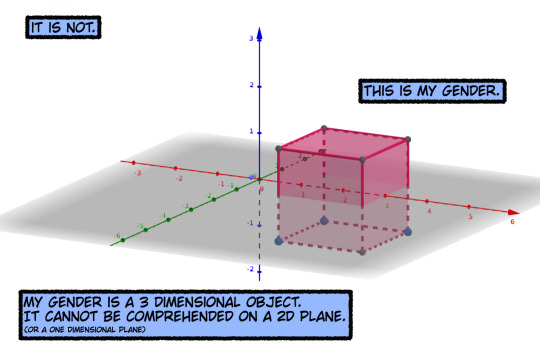
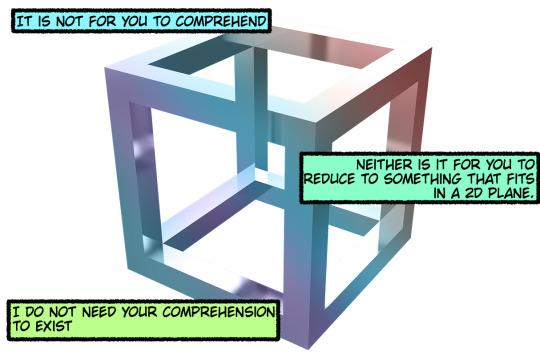
A friend was doing a research project a few months ago about how people describe their gender, and I described it as “[...] a 3 dimensional object, it cannot be comprehended on a 2d plane”. And as I’ve been reflecting on my gender and being two-spirit, I put together a small thing based on that.
This is about being two-spirit
❌White Nonbinary People, This Is Not About You or For You To Relate To❌
[Image ID:
Image one: An x-axis of a graph is shown in red, with the points between 1 and 3 being highlighted blue. The text overlay reads “Imagine the gender binary as a one dimensional plane... Everything is on the line, and you can only exist on the line. Everyone is a line, you can only be a line. Looking at this blue object, it looks like a line.”
Image two: A graph with an x and y axis is shown, the blue line from the first image is one side of a blue square. The text overlay reads “The object is actually a square. You can’t see that when you’re in a one dimensional plane (As those who only understand the gender binary do not understand nonbinary people).”
Image three: The same x-y graph is shown, this time with a red square that intersects the x axis. The text overlay reads “Now we see shapes in their entirety, yes? Once we’re not confined to a 1d plane, we can comprehend the 2d objects. We understand that this shape here is not a line, it’s a square.”
Image four: The graph is now a 3-dimensional graph with an x, y, and z axis. The red square from the previous image is one side of a red cube. The text overlay reads “It is not. This is my gender. My gender is a 3 dimensional object, it cannot be comprehended on a 2d plane (or a one dimensional plane).”
Image five: An iridescent impossible cube, as created by M.C. Escher is shown. It resembles a cube, but is an optical illusion, as the edges connect in a way that does not make sense. The text overlay reads “It is not for you to comprehend. Neither is it for you to reduce to something that fits in a 2d plane. I do not need your comprehension to exist.”
End Image ID]
#Eldritch IT Speaks#two spirit#two-spirit#indigenous#gender#i do like how this turned out#this is about being two spirit if you're white and make this about you im legally allowed to hunt you for sport
1K notes
·
View notes
Text

Only part way through, but I just want to give this book a shout out. As an indigenous trans demisexual stone butch, this book has been just a joy to read so far. It's insightful, reflective, well researched, and most importantly imo easy to digest. Even if you don't identify with the ace spectrum I highly recommend it. (Actually, perhaps especially if you don't).
I may have a special interest in sexology. I may have some particularly "out there" kinks. A lot of what I post on this blog may be shameless sapphic horniness. But the thing a lot of allosexual people forget with demisexuality is that my sexuality is only given to those I choose to give it to. Those who "jumped" the demisexual hurdle so to speak. Our sex-obsessed society has otherwise boggled and fascinated me, often feeling like an outsider looking in. Constantly finding allure in it, but always thinking I was missing something as well. This led to a long sexual history of feeling guilty that I wasn't doing it right, I wasn't providing enough, I wasn't partying the right way, I wasn't living in my 20s the way you're supposed to, feeling guilty when I didn't orgasm by the end of a scene and needing to reassure my partner so much after that it's not their fault, etc. This resulted in compromising my own boundaries, as well as feeling othered in the relationship world, even amongst my own queer peers.
I'm now at a point of listening to myself and loving myself that I can celebrate how I experience and perceive sexuality. I can look at the fact that I will have a 5-hour scene where literally nothing happens to my own body, and not only is that alright, that is a beautiful experience of sexuality worthy of celebration. This book is proving validating and eye-opening at the same time. It is providing a large reminder that I am sacred, and only I dictate that.
My Two-Spirit body is sacred.
My trans body is sacred.
My demisexuality is sacred.
My stone butch-ness is sacred.
I am sacred.
#also brown cites literally all of the quotes in this book and that's just so so beautiful#bite me#asexual#acespec#demisexual#butch#stone butch#lesbian#sapphic#two-spirit#sexuality#trans#trans lesbian#books#nonbinary
55 notes
·
View notes
Text
Aspen, a 13-year-old two-spirit Ojibwe person from Thunder Bay, Ontario

Aspen writes over at CBC Kids News:
Hi, my name is Aspen Starr. I am from Biigtigong Nishnaabeg (Pic River First Nation). I am two-spirited and live in Thunder Bay, Ontario. Two-spirited for me, means that I carry both feminine and masculine spirits.
I first told my family that I preferred they/them pronouns when I was 11.
I was still figuring myself out, but knew I wasn’t a girl. I realized that I prefer they/them pronouns, but I was too scared to tell anyone.
Referring to someone using the correct pronouns is not only respecting who they are, but is also a way of showing allyship. Just standing by somebody and telling them that their feelings are valid can mean so much more to a young person than people realize.
For me, they/them pronouns make me feel like I’m free to be who I want to be.
Read the whole piece here.
Top photo: Aspen, centre, with two aunties, who have been their biggest supporters throughout their journey. They are also their best friends. (Image submitted by Deanna Starr to CBC)
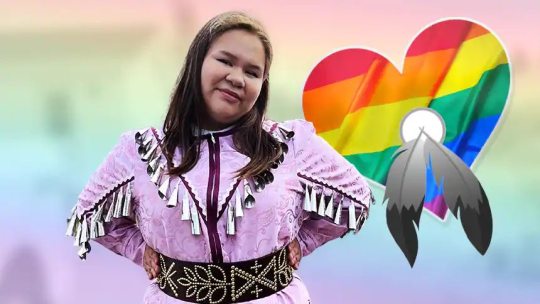
132 notes
·
View notes
Text
How did you come to accept your queer identity?
Comment pls!
#GLBT#LGBT#LGBT+#LGBT2SQQIA#LGBTQ#LGBTQ+#LGBTQI#LGBTQI+#LGBTQIA#LGBTQIA+#LGBTQQIA#QUILTBAG#Lesbian#Gay#Bisexual#Transgender#Asexual#Aromantic#Agender#Queer#Transmasculine#Transfeminine#Pansexual#Non-binary#Genderqueer#Two-spirit#Demisexual#Demiromantic#Polysexual#Genderfluid
24 notes
·
View notes
Text
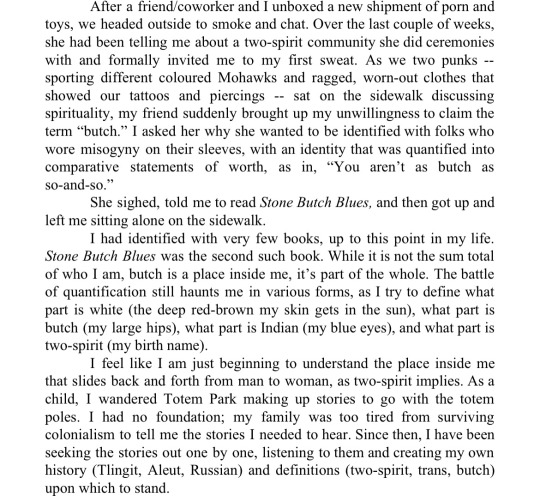
After a friend/coworker and I unboxed a new shipment of porn and toys, we headed outside to smoke and chat. Over the last couple of weeks, she had been telling me about a two-spirit community she did ceremonies with and formally invited me to my first sweat. As we two punks-- showing our tattoos and piercings -- sat on the sidewalk discussing spirituality, my friend suddenly brought up my unwillingness to claim the term "butch". I asked her why she wanted to be identified with folks who wore misogyny on their sleeves, with an identity that was quantified into comparative statements of worth as in, "You aren't as butch as so-and-so."
She sighed, told me to read Stone Butch Blues, and then got up and left me sitting alone on the sidewalk.
I had identified with very few books up to this point in my life. Stone Butch Blues was the second such book. While it is not the sum total of who I am, butch is a place inside me, it's part of the whole. The battle of quantification still haunts me in various forms, as I try to define what part is white (the deep red-brown my skin gets in the sun), what part is butch (my large hips), what part is Indian (my blue eyes), and what part is two-spirit (my birth name).
I feel like I am just beginning to understand the place inside me that slides back and forth from men to woman, as two-spirit implies. As a child, I wandered Totem Park making up stories to go with the totem poles. I had no foundation; my family was too tired from surviving colonialism to tell me the stories I needed to hear. Since then, I have been seeking the stories out one by one, listening to them and creating my own history (Tlinget, Aleut, Russian) and definitions (two-spirit, trans, butch) upon which I stand"
-"Split Myself Apart" by Redwolf Painter, On Butch and Femme: Compiled Readings (I.M. Epstein) (2017)
#on butch and femme#on butch and femme: compiled readings#redwolf painter#lesbian#butch#transgender#two-spirit#trans butch#butch lesbian#lesbian lit#lesbianism#lgbt writing#lgbt+#lgbtq+
117 notes
·
View notes
Photo



Indigenous Peoples Day
Today on the second Monday in October, the USA celebrates Indigenous Peoples Day.
Despite colonial efforts to erase them, there have been and continue to be many unique Indigenous gender identities and sexualities around what is now called the USA, and many Two-spirit and queer Indigenous stories to tell. If you’d like to start learning more, you can check out a few of our podcasts on these topics:
We’wha was a Zuni lhamana - a gender including both masculine and feminine roles. A highly skilled craftsperson, We’wha travelled to Washington DC in 1885 as a representative of the Zuni people, where they worked with anthropologists and the Smithsonian museum to demonstrate and share information about Zuni crafts and culture.
Ohchiish (Osh-Tisch) was a batée born in the 19th-century Crow Nation. Batée is a uniquely Crow gender identity, describing a person assigned male at birth, who performs female as well as specifically batée social roles. Ohchiish was a renowned craftsperson, brave fighter, and the best poker player in the region. In the face of attempts by the US government to force assimilation to Western ideas of gender, their community fought for their right to express their identity.
Bíawacheeitchish (Woman Chief) was a Gros Ventre woman who lived amongst the Crow, having been taken as a captive at a young age. She was skilled in traditionally masculine pursuits like riding, hunting and warfare. Her military prowess led to her becoming one of the most respected Crow chiefs. Polygamy was common amongst the Crow, and Bíawacheeitchish married four women.
Kapaemahu is a monument commemorating the visit of four healers to Honolulu in around the 1500s - the monument consists of four huge stones which are still recognised as a sacred site today. The healers were māhū, a gender recognised in Kānaka Maoli (Native Hawai’ian) culture.
[Images: black-and-white photograph of We’wha in a traditional Zuni dress; black-and-white photo of Ohchiish from Will Roscoe’s Changing Ones: Third and Fourth Genders in Native North America, p.28-9; Illustration of Barcheeampe (Pine Leaf) from The Life and Adventures of James P Beckwourth (1856) - line drawing of a Crow woman riding a horse with a spear in her hand, possibly inspired by Bíawacheeitchish]
#indigenous peoples day#indigenous history#queer history#two-spirit#two-spirit history#we'wha#osh-tisch#ohchiish#biawacheeitchish#woman chief#kapaemahu
257 notes
·
View notes
Photo


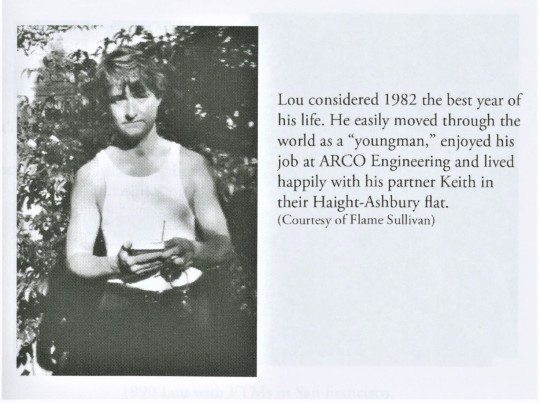
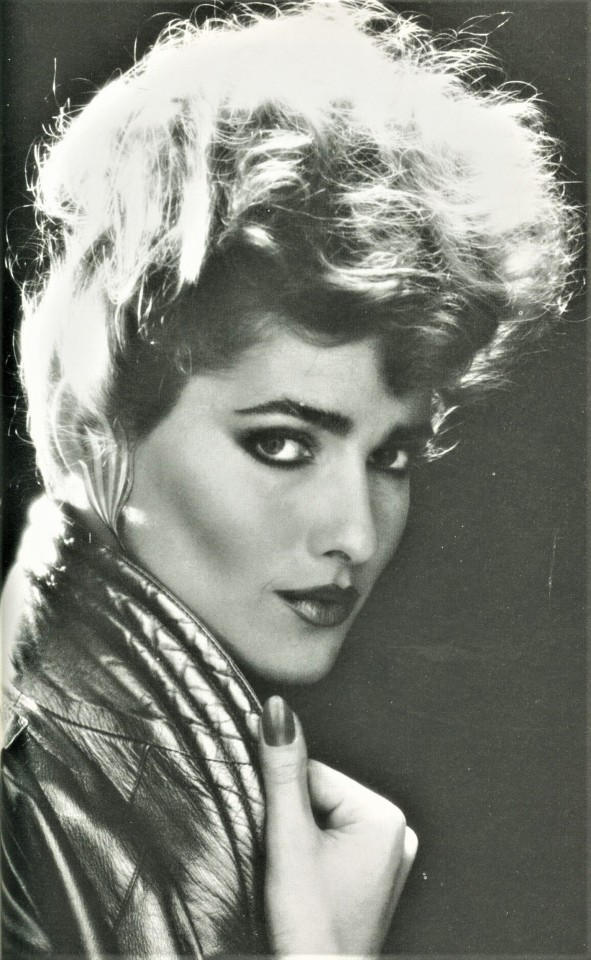

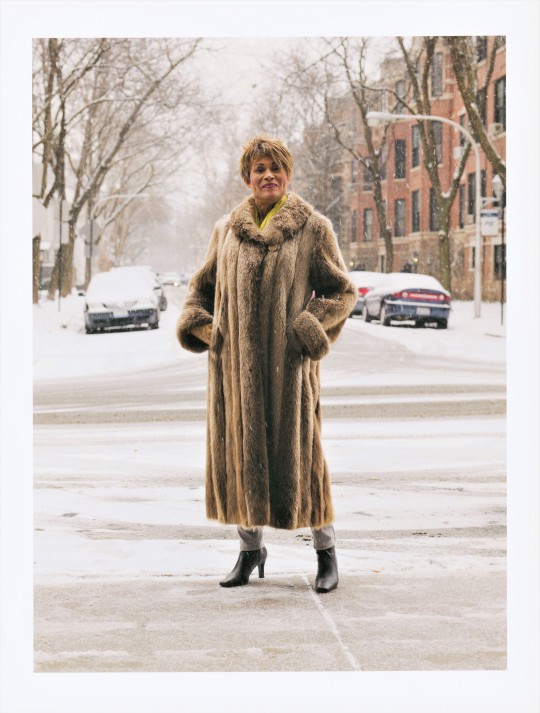
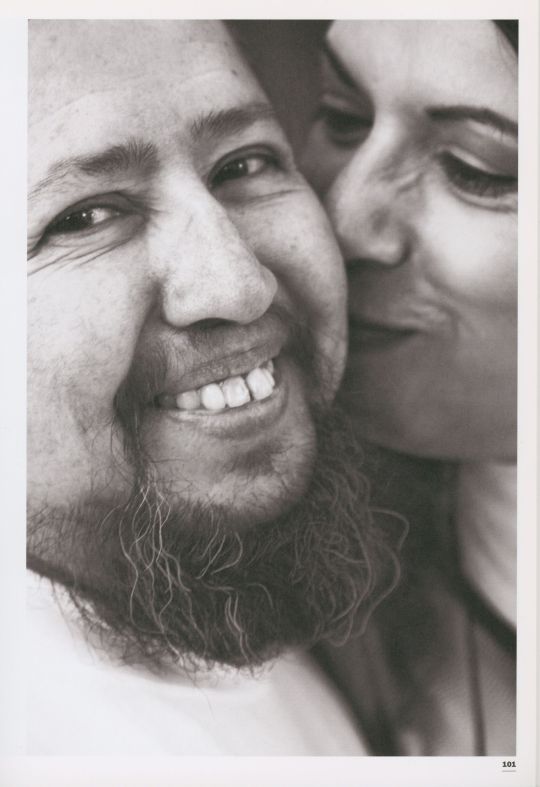

International Trans Day of Visibility
Today we are spotlighting a few of the books from our LGBTQ+ Collection that highlight trans lives and issues. Check out the photo captions to find out what books the images came from.
International Transgender Day of Visibility was created in 2009 by therapist and transgender activist Rachel Crandall Crocker, partially as counterweight to Trans Day of Remembrance, a day of memoriam for all those lost to transgender violence. Crocker wanted "a day that we can just celebrate being ourselves.” More recently, Crocker spoke about the double-edge sword of visibility for trans folks, and called on allies of trans people to make themselves more visible. So for all the cis people reading this, think hard about how you are going to show up for the trans community today, and every day.
-Olivia Hickner, Special Collections Graduate Intern
#International Trans Day of Visibility#Trans Day of Visibility#Rachel Crandall Crocker#Lou Sullivan#Lili Elbe#Christine Jorgensen#Beverly Little Thunder#Tula#Caroline Cossey#Mario Sanchez Perez#Diana Laura Guerrero Sandoval#Bordered Lives#To Survive on This Shore#two-spirit#holidays#olivia#lgbtq+#queer pride#queer#UWM LGBTQ+ Collection
145 notes
·
View notes
Text

Updated profile pic!
I'm part Choctaw Native American and identify as Two-Spirit.
#Power Rangers Dino Charge#Heckyl PRDC#Power Rangers Dino Charge Heckyl#Heckyl#Two-Spirit#Two Spirit#Choctaw#LGBTQIA2S+
29 notes
·
View notes
Text
Nex
(Note: This is a long overdue tribute for Nex Benedict, a two-spirit teenager from the Choctaw Nation in Oklahoma who was the victim of a hate crime)
The schools failed you,
The hospitals failed you,
The state failed you,
The country failed you.
The world has gone still,
The bird's song is now mournful.
When I found out I felt ill,
People go on about "protecting our children",
Yet where were they when you were dying?
The actions are scornful,
Where were they when you were dying?
Where were the people,
When Nex Benedict was dying?
#nex benedict#justice for nex benedict#cw: hate crime#two spirit#two-spirit#2 spirit#2-spirit#lgbtqia2s+#lgbtqia+#lgbtqi+#lgbtq+#lgbt+
138 notes
·
View notes
Text
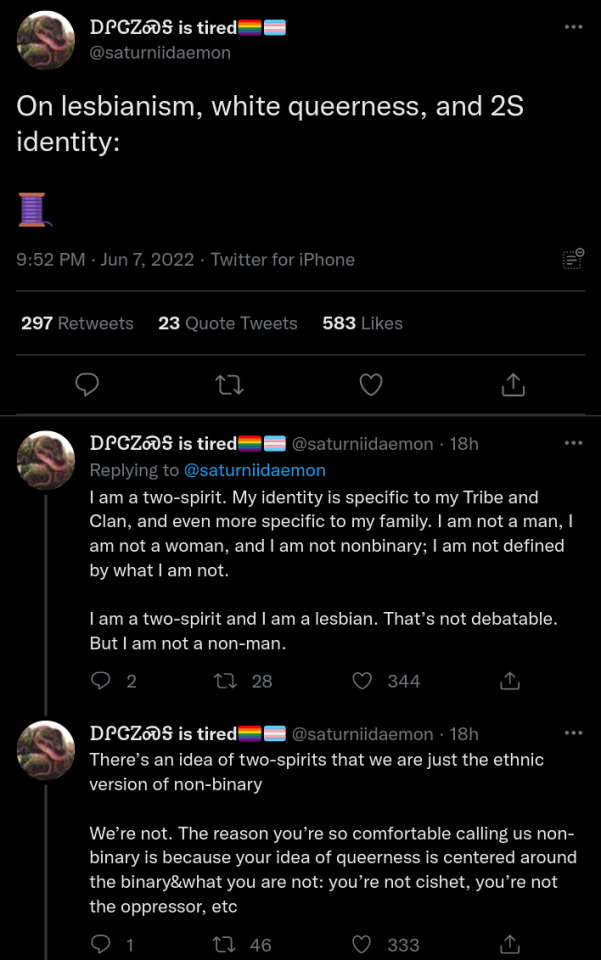
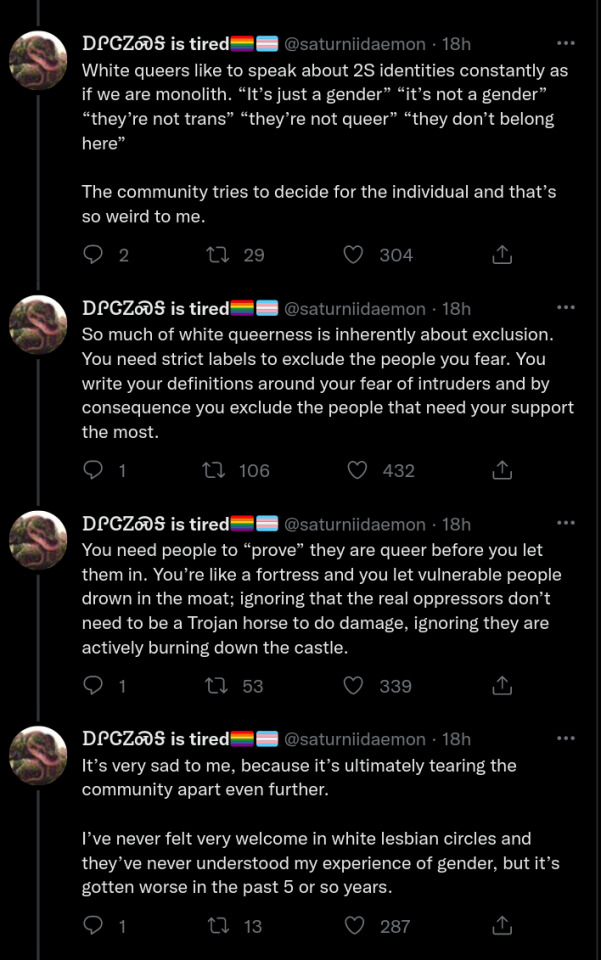
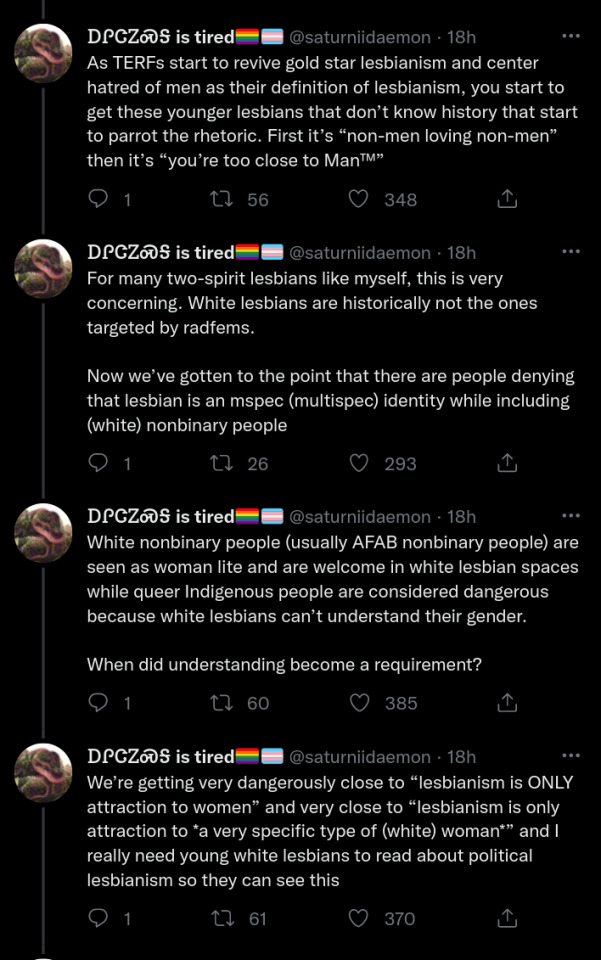


So apparently it’s that time of year again where I have to post about this.
On lesbianism, white queerness, and 2S identity
Text below readmore
I am a two-spirit. My identity is specific to my Tribe and Clan, and even more specific to my family. I am not a man, I am not a woman, and I am not nonbinary; I am not defined by what I am not.
I am a two-spirit and I am a lesbian. That's not debatable.
But I am not a non-man.
There's an idea of two-spirits that we are just the ethnic version of non-binary
We're not. The reason you're so comfortable calling us nonbinary is because your idea of queerness is centered around the binary&what you are not: you're not cishet, you're not the oppressor, etc
White queers like to speak about 2S identities constantly as if we are monolith. "It's just a gender" "it's not a gender"
"they're not trans" "they're not queer" "they don't belong here"
The community tries to decide for the individual and that's so weird to me.
So much of white queerness is inherently about exclusion.
You need strict labels to exclude the people you fear. You write your definitions around your fear of intruders and by consequence you exclude the people that need your support the most.
You need people to "prove" they are queer before you let them in. You're like a fortress and you let vulnerable people drown in the moat; ignoring that the real oppressors don't need to be a Trojan horse to do damage, ignoring they are actively burning down the castle.
It's very sad to me, because it's ultimately tearing the community apart even further.
I've never felt very welcome in white lesbian circles and they've never understood my experience of gender, but it's gotten worse in the past 5 or so years.
As TERFs start to revive gold star lesbianism and center hatred of men as their definition of lesbianism, you start to get these younger lesbians that don't know history that start to parrot the rhetoric. First it's "non-men loving non-men" then it's "you're too close to Man™"
For many two-spirit lesbians like myself, this is very concerning. White lesbians are historically not the ones targeted by radfems.
Now we've gotten to the point that there are people denying that lesbian is an spec (multispec) identity while including (white) nonbinary people
White nonbinary people (usually AFAB nonbinary people) are seen as woman lite and are welcome in white lesbian spaces while queer Indigenous people are considered dangerous because white lesbians can't understand their gender.
When did understanding become a requirement?
We're getting very dangerously close to "lesbianism is ONLY attraction to women" and very close to "lesbianism is only attraction to *a very specific type of (white) woman*" and I really need young white lesbians to read about political lesbianism so they can see this
I don't want to hear "not all lesbians" or "well then they aren't welcome" because every time this rhetoric goes unchallenged you are actively welcoming these people to continue it and make it more and more extreme. Yes, even the kind that seems to have nothing to do with racism
Almost all of your exclusionary rhetoric is based on the racist ideas of political lesbianism and I do not know why you all cannot see that they want to move goalposts. It wasn't just bi lesbians, it wasn't just he/him lesbians, it wasn't just nonbinary lesbians. It's a tactic.
It really feels like young lesbians are not only letting us go backwards, but encouraging it. And that's thanks in part to the historical racism of political lesbianism, but many of these people ARE old enough to think critically and talk to people who've been through this.
So far I've seen this in younger lesbian spaces; the ones with older generations (the ones that don't welcome TERFs) have been pretty welcoming even if not totally understanding, because they at least recognize that you don't need to understand someone's experience to validate it.
But I'm really concerned for the young Indigenous lesbians who don't feel comfortable around older people and are going to these younger lesbian spaces only to be indoctrinated with thinly veiled TERF rhetoric. It makes me very concerned for our spaces as well.
So I'll say again
I am not a non-man and I am not a non-woman. I'm not defined by what I am not. I do not ascribe to your binary-centric definitions of queerness. I experience queer attraction to women. I'm a lesbian. You do not get to use community to decide my individuality.
Thread by ~Alitsanosga
Pronouns: hi'a/vsgina/utseli/uwasa
#two spirit#two-spirit#2slgbtqia+#2 spirit#lesbian#white queers#white queerness#racism#colonialism#political lesbianism#inclusion is survival#indigeneity#indigenous rights
53 notes
·
View notes
Text
Want to send in new work to beestung, our online quarterly micro magazine for two-spirit, non-binary, and genderqueer writers and artists?
We're only accepting work by three more people, then closing for subs till August!
https://beestungmag.com/about/
7 notes
·
View notes
Text
being mixed indigenous sucks sometimes lol i hate being so disconnected from my culture. ugh
i was trying to look into resources for potawatomi third genders / two-spirit but it's hard to find reliable ones and even harder to find ones from two-spirit people themselves. i've seen terms like m'netokwe mentioned before that might appeal to me but there's hardly any extensive resources on them out there
#♡ muyang mutters#two spirit#2s#two-spirit#potawatomi#bodéwadmi#neshnabé#anishnaabe#native american#mixed native#indigenous#lgbtq#lgbtqia
9 notes
·
View notes
Text
I've realized something the last few days. I've never experienced big city queer culture. Most Canadian cities are notoriously small compared to metropolis sized centers like San Francisco, Washington, London, New York, Toronto or Vancouver aside of course. While the city I'm in is in fact a city, we're in that weird "big town, small city" micro-cosm of feeling like a big queer community up until you realize it really isn't.
We currently only have like. 3 gay bars, and one of them has lowkey been rejected by the community for pandering to rainbow washing and it's rampant ableism/micro-transphobia. The other is incredibly loud and packed all the time, and the third just feels a little sticky at all times. We don't have dedicated lesbian spaces. The bars we do have, only one is accessible. We don't really have alcohol free queer spaces. Usually our events are so dominated by white people that BIPOC queers just don't show up, and I feel alone as an indigenous person.
Just about every dyke I know in this city at this point complains about having slept with eachother by 3 person proxy at the very least. I can't go out without risking running into an ex, or a friend of an ex. Every Non-monoganous person here has heard of or met "that one guy" in the poly community because word just gets around like that in a smaller space (he loves the reputation don't worry). Every trans femme has at one point or another has a well meaning Gen X cishet person ask us if we know a certain trans woman that championed trans rights like 30+ years ago (it doesn't help that I actually had dinner with her once a year as a kid).
We've also had people used to big city culture come here and comment on the fact that our culture is amazing because of this unique position. Our Pride Parade isn't a party. It's still actively a protest, it's still a march to remind the conservative government that wants to take our rights away that we will fight them tooth and nail. Every big city queer who attends our Pride has said so to me. It's a point of well, pride for me. But, I want to see their party. I want to see what guaranteed diverse community feels like.
As a baby queer I thought my city's queer culture would never cease to show me new things, but as time goes on I realized its small. Being single, I've realized how not tied down I am. I'm free to go wherever really, within financial limitations. I want to travel. I want to go to big cities. I want to engage in big big queer communities abroad. Learn what their experiences are. How their local history shaped their slang, titles, identities, and social networks. I want to expand how I love my queer self and community by seeing how others love their queer selves and community.
#in my realizing just how independent i am feels again#bite me#butch#nonbinary#sapphic#lesbian#queer#lgbtqia+#lgbtqia#two-spirit#trans#transgender#lgbt pride#trans pride#lesbian pride#gay pride#pride
30 notes
·
View notes